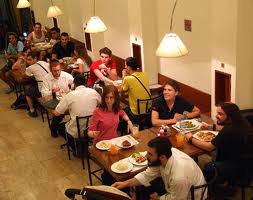
It is one of the most important factors of holistic wellbeing, the social factor, or relationships with others. Families, friends and other social networks are a must for a happy, balanced, healthy and purposeful existence.
Being inherent social beings and greatly influenced by the company we keep around us, and if we surround ourselves with healthy and positive people and networks, not only do we feel better about ourselves, we have a tendency to mindlessly pack on the pounds! A powerful research reported in the July 2007 Edition of The New England Journal of Medicine suggested that one of the reasons for widespread obesity in developed countries (such as the United States) is increased societal connection. Using data of the Framingham Heart Study (a long-term health study that has been going on since 1948), Dr. Nicholas Christakis, MD, Ph.D., of Harvard Medical School found that weight gain spreads from person to person among social networks. 
What this means is that when addressing obesity, an individual's social networks must be considered.
Chistakis's study found that people who were only one degree removed from each other, like siblings and close friends influenced one another two times as much as people who were two degrees removed from each other.
What about Internet social networks, or Facebook, dating sites, meet up groups, and professional networking sites? The social groups that one belongs to on the web is highly influential. Many social networks can be dangerous to a person's health if poor nutrition, fitness or dieting advice is offered. Social networks on the Internet can be extremely beneficial and motivational if people are careful about the ones that they join. Social networks with family ties can be trickier. If you find yourself in a social network that you think subliminally or overtly encourages and unhealthy lifestyle, then be a leader. One or two strong leaders in a network can have a huge impact on its members! 
If you are or desire to be more healthy conscience, you are not destined for a life of dining alone! You will, however, need to think ahead and pre-plan a bit more than the average Joe at times. Without having to give up your social calendar entirely and the important interactions and connections you make when having fun, the following are techniques to be mindful of so you won’t have to feel restricted and embarrassed by opting for healthier food and drink options and choices.
If someone else makes the plans, a few well-placed phone calls in advance or on line menus can reveal a lot about a restaurant — you can explain your dietary needs and ask what options are available . It is good to call ahead and do some research before, so that you're not seeming too “high maintenance” at the dinner table. Most restaurants can accommodate almost any kind of dietary needs. It can also impress your friends and family if you walk into the restaurant and the staff already knows what you're eating — as if you were a "regular."
If you're usually not comfortable with the restaurant selected by others, then offer to pick the place yourself. Keep in mind that it helps to have already done some advance work to find a healthier restaurant choice. Try to offer several options and a variety of cuisines to your potential dining companions. 
If you're invited to someone's house or to a party, bring a low-calorie, low-fat dessert or food option (e.g., vegetable plate or fruit salad). Your host will see it as gracious, and you will have your own healthy food option as back up in case there are no particular foods that peak your interest.
I know that this sounds a bit off-the-wall, but if you eat before going to a major event (e.g., wedding or birthday party), you can avoid eating high-calorie and high-fat foods. Frequently at these events, the main course is not served until well after everyone has arrived — which means you can easily become ravenous by this time, and end up eating anything and everything, which people often do. This way, you don't end up eating the entire basket of bread and can enjoy the conversations and people better, instead of focusing on what and when to eat.
If you are going to someone's house for dinner (or even a restaurant), you can tell your host that you have a medically restricted diet and that you can only eat certain foods. I've found that using the phrase "medical" quells questions — and most are happy to oblige.
It can help to talk to your family and friends about the healthy food changes you are making and gain their support. The idea is not to have them police your behavior, but to empower you by being enthusiastic and supportive of your new way of life. Stand up for your beliefs and for the truth in the healthy practice you have learned and adopted. Social connections are important, but there is nothing better than feeling and looking like a beaming ray of wellness!
